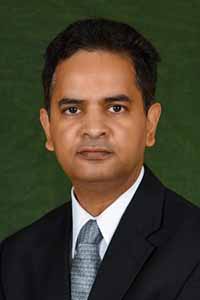NCInnovation awards pilot grants to two Charlotte researchers

Two UNC Charlotte researchers have been selected by NCInnovation’s Board of Directors to continue their work through a pilot grant program.
Sukumar Kamalasadan, Duke Energy Distinguished Professor of Electric Power Engineering, and Jordan Poler, professor of chemistry, are among eight UNC System faculty selected for grants.
Kamalasadan’s research will focus on power grid efficiency, and Poler’s research will focus on drinking water purification.
“UNC Charlotte’s groundbreaking research from the labs of Dr. Poler and Dr. Kamalasadan has the capacity for far-reaching economic impact for the state of North Carolina,” said Michelle Bolas, NCInnovation executive vice president and chief innovation officer. “These advancements in drinking water purification and power grid efficiency address important environmental and public safety issues. We’re excited to see these projects continue to progress.”
As part of the initial pilot, eight grants totaling $5.2 million were awarded Wednesday, May 15. Project-specific funding totals will be made public after the researchers and NCInnovation formally sign grant agreement contracts.
“As an emerging top-tier research university, UNC Charlotte and its researchers are developing breakthroughs in areas such as energy, advanced manufacturing, cybersecurity and biotechnology,” said UNC Charlotte Chancellor Sharon L. Gaber. “We’re thankful to state lawmakers and NCInnovation for recognizing the importance of university-applied research to our state’s economy. It’s great to see Charlotte professors Jordan Poler and Sukumar Kamalasadan, who are conducting impactful work, receive NCInnovation’s support.”
Both professors have received patents for their research and have decades of experience in their fields. The grants will provide funding and coordination to help them advance their discoveries toward commercialization.
“I’m thrilled that NCInnovation is investing in two of UNC Charlotte’s many areas of excellence: clean water and energy,” said John Daniels, vice chancellor of research. ”UNC Charlotte has a large and growing portfolio of mature research, ripe for commercialization and investment. Dr. Jordan Poler’s work to remove so-called forever chemicals addresses an emerging worldwide contaminant. Likewise, Dr. Sukumar Kamalasadan’s work to develop uninterruptible power with unparalleled quality is vital to our nation’s economy, environment, health and public safety.”
Also, both projects support industry partnerships and will help to create jobs in North Carolina, Daniels said.
Power grid efficiency

Grid Ancillary services with Uninterruptible Power Supply, developed by Kamalasadan, provides uninterrupted, pristine power quality to commercial or industrial companies where prolonged power outages could cause economic, health, environment or public safety problems.
The technology delivers reserve capacity and essential ancillary services to utilities to address unexpected faults and improve reliability. The grant will help advance the technology toward a field demonstration, a critical requirement for commercialization. Kamalasadan will partner with Duke Energy on the field demonstration.
Kamalasadan, a 2008 National Science Foundation Early CAREER Award recipient, also serves as the director of the Power Energy and Intelligent Systems Lab within the Energy Production and Infrastructure Center. His research work has secured more than $13 million with his direct supervision from the U.S. Department of Energy, NSF, Siemens Research, Duke Energy Corp., Schweitzer Engineering Lab and several other industries. In addition, he is the founding director of EPIC’s Duke Energy Smart Grid Laboratory.
In partnership with Duke Energy, he has filed several patents on battery energy storage controller technology. His research team includes master’s and doctoral students in the William S. Lee College of Engineering.
Drinking water purification

The grant will allow Poler to expand on his team’s recent innovations in water purification that have led to the creation of patented materials capable of removing harmful compounds more effectively than current market solutions.
Poler founded startup naneXPure LLC and will work with Goulston Technologies, based in Monroe, to scale up the drinking water purification materials from bench to industry scale.
At UNC Charlotte, Poler leads a research group that includes students from various disciplines focused on the development of advanced materials.
Poler’s research on water purification materials, which includes the synthesis of polyelectrolytes, novel coordination complexes and nanostructured materials, shows the potential of nanoscale science to create impactful, real-world solutions to improve public health, he said.
Poler, a Fulbright scholar, has previously received grants from the Environmental Protection Agency, the National Science Foundation and the Department of Defense for his research on water purification.
Supporting applied research
NCInnovation, a nonprofit founded in 2020 and supported through a $500 million endowment from North Carolina’s General Assembly, is focused on helping university innovations advance toward commercialization by supporting university applied research through the critical R&D phase between proof concept and readiness for the private market.
In general, researchers will use the grants to fund laboratory work, materials ranging from biological samples to hard metals, support staff, market analyses, and other needs related to ongoing research.
The grant funding is part of NCInnovation’s larger effort to support the development and commercialization of university research in North Carolina. NCInnovation expects to issue a statewide call for grants later this year.
UNC Charlotte is the only university to receive multiple grants.
UNC Charlotte, along with East Carolina University, North Carolina A&T State University and Western Carolina University, are anchor institutions for NCInnovation’s regional work, connecting to other state universities and higher education institutions. NCInnovation’s Charlotte Regional Network is led by Regional Innovation Network Director Mary Lou Bourne.